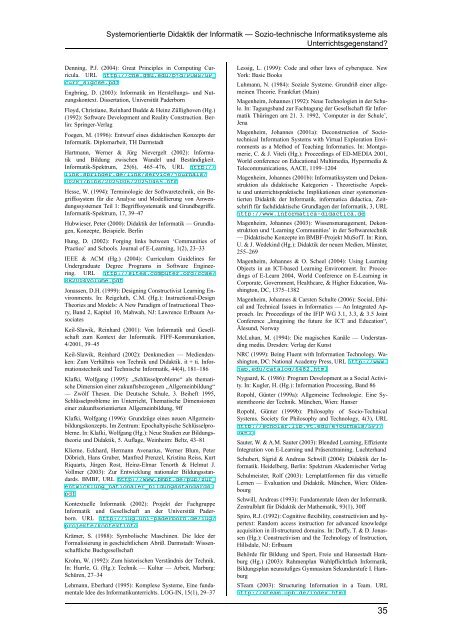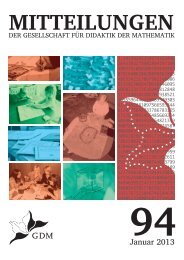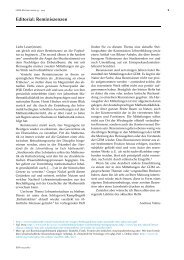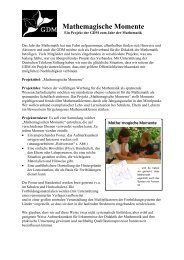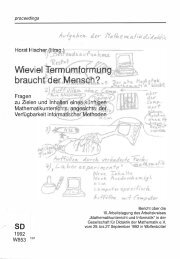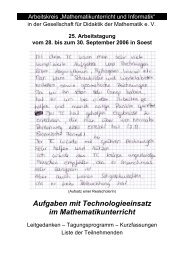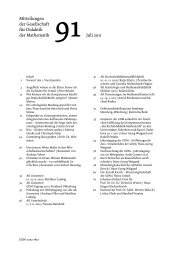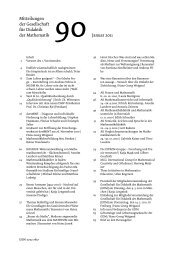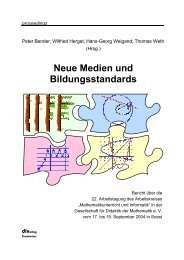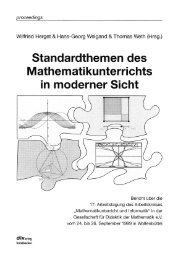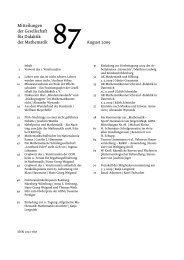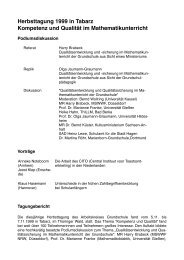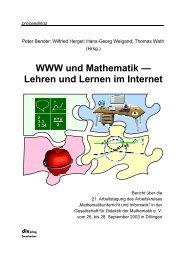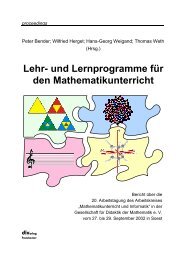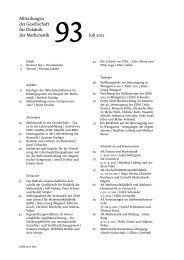Informatische Ideen im Mathematikunterricht - Gesellschaft für ...
Informatische Ideen im Mathematikunterricht - Gesellschaft für ...
Informatische Ideen im Mathematikunterricht - Gesellschaft für ...
Erfolgreiche ePaper selbst erstellen
Machen Sie aus Ihren PDF Publikationen ein blätterbares Flipbook mit unserer einzigartigen Google optimierten e-Paper Software.
Systemorientierte Didaktik der Informatik — Sozio-technische Informatiksysteme als<br />
Unterrichtsgegenstand?<br />
Denning, P.J. (2004): Great Principles in Computing Curricula.<br />
URL http://cne.gmu.edu/pjd/PUBS/GP_<br />
curr_sigcse.pdf<br />
Engbring, D. (2003): Informatik <strong>im</strong> Herstellungs- und Nutzungskontext.<br />
Dissertation, Universität Paderborn<br />
Floyd, Christiane, Reinhard Budde & Heinz Züllighoven (Hg.)<br />
(1992): Software Development and Reality Construction. Berlin:<br />
Springer-Verlag<br />
Foegen, M. (1996): Entwurf eines didaktischen Konzepts der<br />
Informatik. Diplomarbeit, TH Darmstadt<br />
Hartmann, Werner & Jürg Nievergelt (2002): Informatik<br />
und Bildung zwischen Wandel und Beständigkeit.<br />
Informatik-Spektrum, 25(6), 465–476, URL http://<br />
link.springer.de/link/service/journals/<br />
00287/bibs/2025006/20250465.htm<br />
Hesse, W. (1994): Terminologie der Softwaretechnik, ein Begriffssystem<br />
<strong>für</strong> die Analyse und Modellierung von Anwendungssystemen<br />
Teil 1: Begriffssystematik und Grundbegriffe.<br />
Informatik-Spektrum, 17, 39–47<br />
Hubwieser, Peter (2000): Didaktik der Informatik — Grundlagen,<br />
Konzepte, Beispiele. Berlin<br />
Hung, D. (2002): Forging links between ‘Communities of<br />
Practice’ and Schools. Journal of E-Learning, 1(2), 23–33<br />
IEEE & ACM (Hg.) (2004): Curriculum Guidelines for<br />
Undergraduate Degree Programs in Software Engineering.<br />
URL http://sites.computer.org/ccse/<br />
SE2004Volume.pdf<br />
Jonassen, D.H. (1999): Designing Constructivist Learning Environments.<br />
In: Reigeluth, C.M. (Hg.): Instructional-Design<br />
Theories and Models: A New Paradigm of Instructional Theory,<br />
Band 2, Kapitel 10, Mahwah, NJ: Lawrence Erlbaum Associates<br />
Keil-Slawik, Reinhard (2001): Von Informatik und <strong>Gesellschaft</strong><br />
zum Kontext der Informatik. FIFF-Kommunikation,<br />
4/2001, 39–45<br />
Keil-Slawik, Reinhard (2002): Denkmedien — Mediendenken:<br />
Zum Verhältnis von Technik und Didaktik. it + ti. Informationstechnik<br />
und Technische Informatik, 44(4), 181–186<br />
Klafki, Wolfgang (1995): „Schlüsselprobleme“ als thematische<br />
D<strong>im</strong>ension einer zukunftsbezogenen „Allgemeinbildung“<br />
— Zwölf Thesen. Die Deutsche Schule, 3. Beiheft 1995,<br />
Schlüsselprobleme <strong>im</strong> Unterricht, Thematische D<strong>im</strong>ensionen<br />
einer zukunftsorientierten Allgemeinbildung, 9ff<br />
Klafki, Wolfgang (1996): Grundzüge eines neuen Allgemeinbildungskonzepts.<br />
Im Zentrum: Epochaltypische Schlüsselprobleme.<br />
In: Klafki, Wolfgang (Hg.): Neue Studien zur Bildungstheorie<br />
und Didaktik, 5. Auflage, Weinhe<strong>im</strong>: Beltz, 43–81<br />
Klieme, Eckhard, Hermann Avenarius, Werner Blum, Peter<br />
Döbrich, Hans Gruber, Manfred Prenzel, Kristina Reiss, Kurt<br />
Riquarts, Jürgen Rost, Heinz-Elmar Tenorth & Helmut J.<br />
Vollmer (2003): Zur Entwicklung nationaler Bildungsstandards.<br />
BMBF, URL http://www.bmbf.de/pub/zur_<br />
entwicklung_nationaler_bildungsstandards.<br />
pdf<br />
Kontextuelle Informatik (2002): Projekt der Fachgruppe<br />
Informatik und <strong>Gesellschaft</strong> an der Universität Paderborn.<br />
URL http://iug.uni-paderborn.de/iug/<br />
projekte/kontextinfo<br />
Krämer, S. (1988): Symbolische Maschinen. Die Idee der<br />
Formalisierung in geschichtlichem Abriß. Darmstadt: Wissenschaftliche<br />
Buchgesellschaft<br />
Krohn, W. (1992): Zum historischen Verständnis der Technik.<br />
In: Hurrle, G. (Hg.): Technik — Kultur — Arbeit, Marburg:<br />
Schüren, 27–34<br />
Lehmann, Eberhard (1995): Komplexe Systeme, Eine fundamentale<br />
Idee des Informatikunterrichts. LOG-IN, 15(1), 29–37<br />
Lessig, L. (1999): Code and other laws of cyberspace. New<br />
York: Basic Books<br />
Luhmann, N. (1984): Soziale Systeme. Grundriß einer allgemeinen<br />
Theorie. Frankfurt (Main)<br />
Magenhe<strong>im</strong>, Johannes (1992): Neue Technologien in der Schule.<br />
In: Tagungsband zur Fachtagung der <strong>Gesellschaft</strong> <strong>für</strong> Informatik<br />
Thüringen am 21. 3. 1992, ’Computer in der Schule’,<br />
Jena<br />
Magenhe<strong>im</strong>, Johannes (2001a): Deconstruction of Sociotechnical<br />
Information Systems with Virtual Exploration Environments<br />
as a Method of Teaching Informatics. In: Montgomerie,<br />
C. & J. Viteli (Hg.): Proceedings of ED-MEDIA 2001,<br />
World conference on Educational Mult<strong>im</strong>edia, Hypermedia &<br />
Telecommunications, AACE, 1199–1204<br />
Magenhe<strong>im</strong>, Johannes (2001b): Informatiksystem und Dekonstruktion<br />
als didaktische Kategorien - Theoretische Aspekte<br />
und unterrichtspraktische Implikationen einer systemorientierten<br />
Didaktik der Informatik. informatica didactica, Zeitschrift<br />
<strong>für</strong> fachdidaktische Grundlagen der Informatik, 3, URL<br />
http://www.informatica-didactica.de<br />
Magenhe<strong>im</strong>, Johannes (2003): Wissensmanagement, Dekonstruktion<br />
und ‘Learning Communities’ in der Softwaretechnik<br />
— Didaktische Konzepte <strong>im</strong> BMBF-Projekt MuSofT. In: Rinn,<br />
U. & J. Wedekind (Hg.): Didaktik der neuen Medien, Münster,<br />
255–269<br />
Magenhe<strong>im</strong>, Johannes & O. Scheel (2004): Using Learning<br />
Objects in an ICT-based Learning Environment. In: Proceedings<br />
of E-Learn 2004, World Conference on E-Learning in<br />
Corporate, Government, Healthcare, & Higher Education, Washington,<br />
DC, 1375–1382<br />
Magenhe<strong>im</strong>, Johannes & Carsten Schulte (2006): Social, Ethical<br />
and Technical Issues in Informatics — An Integrated Approach.<br />
In: Proceedings of the IFIP WG 3.1, 3.3, & 3.5 Joint<br />
Conference „Imagining the future for ICT and Education“,<br />
Ålesund, Norway<br />
McLuhan, M. (1994): Die magischen Kanäle — Understanding<br />
media. Dresden: Verlag der Kunst<br />
NRC (1999): Being Fluent with Information Technology. Washington,<br />
DC: National Academy Press, URL http://www.<br />
nap.edu/catalog/6482.html<br />
Nygaard, K. (1986): Program Development as a Social Activity.<br />
In: Kugler, H. (Hg.): Information Processing, Band 86<br />
Ropohl, Günter (1999a): Allgemeine Technologie. Eine Systemtheorie<br />
der Technik. München, Wien: Hanser<br />
Ropohl, Günter (1999b): Philosophy of Socio-Technical<br />
Systems. Society for Philosophy and Technology, 4(3), URL<br />
http://scholar.lib.vt.edu/ejournals/SPT/<br />
v4n3/<br />
Sauter, W. & A.M. Sauter (2003): Blended Learning, Effiziente<br />
Integration von E-Learning und Präsenztraining. Luchterhand<br />
Schubert, Sigrid & Andreas Schwill (2004): Didaktik der Informatik.<br />
Heidelberg, Berlin: Spektrum Akademischer Verlag<br />
Schulmeister, Rolf (2003): Lernplattformen <strong>für</strong> das virtuelle<br />
Lernen — Evaluation und Didaktik. München, Wien: Oldenbourg<br />
Schwill, Andreas (1993): Fundamentale <strong>Ideen</strong> der Informatik.<br />
Zentralblatt <strong>für</strong> Didaktik der Mathematik, 93(1), 30ff<br />
Spiro, R.J. (1992): Cognitive flexibility, constructivism and hypertext:<br />
Random access instruction for advanced knowledge<br />
acquisition in ill-structured domains. In: Duffy, T. & D. Jonassen<br />
(Hg.): Constructivism and the Technology of Instruction,<br />
Hillsdale, NJ: Erlbaum<br />
Behörde <strong>für</strong> Bildung und Sport, Freie und Hansestadt Hamburg<br />
(Hg.) (2003): Rahmenplan Wahlpflichtfach Informatik,<br />
Bildungsplan neunstufiges Gymnasium Sekundarstufe I. Hamburg<br />
STeam (2003): Structuring Information in a Team. URL<br />
http://steam.upb.de/index.html<br />
35


